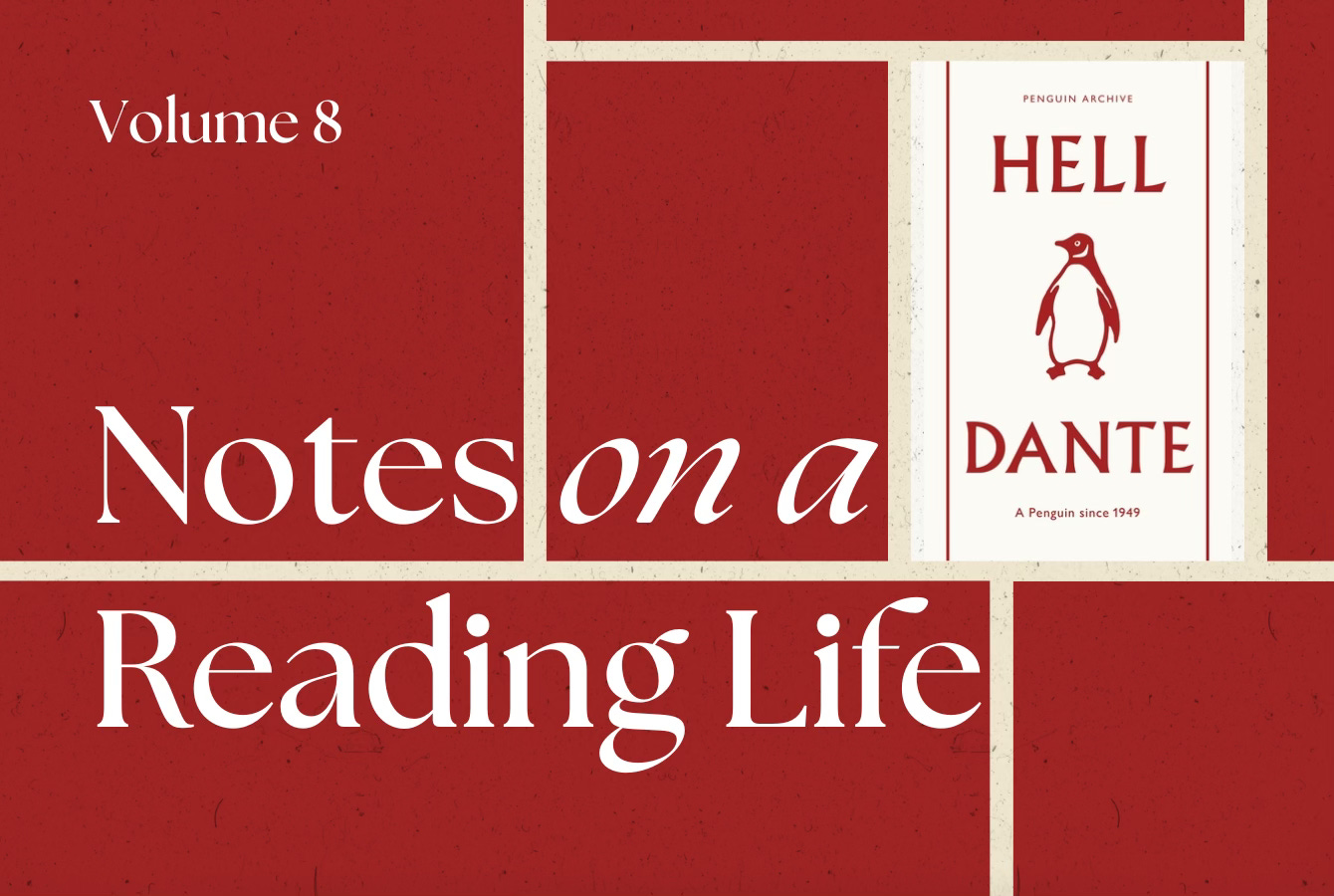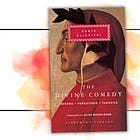A Question of Judgement
A 3,000 foot view of "Inferno", moral responsibility, and learning to discern the good from the bad.
“Thence we came forth, to look once more upon the stars.”
[Dante, “Inferno”]
So we emerge from the inferno, into the bright light of real life as we close the poem. The mountain of Purgatory is ahead, waiting to be climbed in the second book of The Divine Comedy, but let’s not leave Inferno behind just yet. There’s still much to be gleaned after the harvest. For instance: in the last column, we looked at some of the details along the way, but what about the larger picture, the architectural whole?
My thinking about this was initially shaped by considering Dante’s theology (which was, after all, his primary concern in writing the Comedy). There’s one scene that stayed with me when it came to the poet’s theodicy, specifically how he aligns God’s good with the evil of Hell — an infinite punishment for finite crimes with no possibility of parole or pardon, a system that God himself (as Dante keeps reminding us) created and maintains.
In Canto 20, Dante (the character) weeps over the disfigured bodies of fortune-tellers whose heads have been twisted around, so these magicians who in life looked forward to the future must in death look forever back. And Virgil gives him the 14th century theodicean version of “man up”, telling him to get over it:
“Here pity, or here piety, must die
If the other lives …”1
In other words: you can blaspheme by feeling bad for those judged harshly by God, or you can shrug off your sympathy and leave the judgment to Him. Put another way: abide by your moral conscience, or abdicate your moral responsibility.2
This reminded me of Richard Holloway’s The Good Book: How to read the Bible, and his reading in it of the Good Samaritan story. Where most readers take the parable to be one of religious hypocrisy, Holloway argues that the priest and the Levite who leave the injured man at the side of the road are actually behaving in accordance with their strict religious admonition against “ritual defilement”. To help the unknown victim on the road would have threatened their “state of ritual purity”:
“Scoff if you must, but this is not moral hypocrisy; it is a justifiable decision, given the internal logic of the religious system followed by both men.” [My emphasis]
This is how you wind up with people who shoot up abortion clinics — a psychotic adherence to a programmatic ideology that allows no deviation from its values.
The hero of the story is the Samaritan who put aside the tribal enmity between his people and the victim’s to listen to his soul. Samaritans also followed the Torah, but instead of making the same calculation as the priest and the Levite, “something else happens, something shattering”:
“Unfortunately, our English translation does not capture the explosive nature of the event: it tells us that ‘he was moved with pity’, but that phrase does not catch the power of his reaction. The Greek verb at the heart of the story is esplanknise and behind it lies a neuter plural noun ta splankna, meaning entrails or bowels. It is a powerful word: at the sight of the naked and bleeding man at the roadside the Samaritan’s guts churned inside him with such ferocity that it simply obliterated the purity code. The passion of his pity for a fellow human blew down the walls that ritually separated him from a supposed enemy.”
Here, pity isn’t in opposition to piety; instead, that human passion moves us towards the Divine. With all respect but no undue deference to Dante, this is a form of faith I find more moving and more convincing than his own rather hard-hearted convictions.
I couldn’t stop thinking about this after I’d closed the book to get on with the more prosaic aspects of life. Something seemed off about how I was reading that section of Inferno. My interpretation seemed a little basic, a little too close to the “atheist DESTROYS the Bible” strain of Biblical criticism. Throughout Inferno, I’ve been struck by how nuanced the poetry is. The ideas are multivalent, the language is layered. Dante was a man of multiple meanings, whose poetics suggest that no matter how certain he seems on the page, there’s always ambiguity between his lines.
Yet, in my reading, I’ve reduced him to a fundamentalist.
So, if Dante didn’t want us to think and feel for ourselves, why would he write a three-part, 100 canto, epic poem that takes the cold logic of the church, the dusty stories of the ancients, and the distant abstractions of theology to weave a story that moves us? He reaches past the intellect and straight to the heart of things. If you want reason, write a syllogism; if you want converts, sing them a song. Dante is trying to remind the soul what it already knows, not to convince the mind of something new.
Dante wants us to align our ethics with those of the god he worships, but not as the result of a cosmic “because I said so” from a great parent in the sky. Dante wants us to use our moral, intellectual, and aesthetic faculties to authentically agree with God’s judgements, rather than passively — or cynically — giving in to divine diktat.
At a fundamental level, this is a core message of Inferno: there is no quick and easy route to the top of the mountain, to join the Divine — you have to take the long, arduous way there. In light of this, we can read that whole section mentioned above, the part about pity or piety having to die for the other to live, quite differently.
When Virgil commands Dante to give up either “pity” or “piety”, perhaps he means something larger than either of those specific terms. “Here pity, or here piety, must die” could be read as something like:
When your reason and your gut disagree, you have to choose one over the other.
The argument is that our whims and momentary preferences should be subordinated to a moral framework we’ve already agreed to. Passion is cheap, coming easily and costing nothing, and it requires no deep self-interrogation. It tries to pass itself off as axiomatic: Why do you pity these souls, Dante? Because I do! Because I feel bad for them! Moral sentiment demands nothing of us, while moral judgement calls us to engage with the world as active participants in it. And it allows us to judge with some greater measure of objectivity than we would by following our tastes, which can change depending on context and can shift to serve our selfish needs.
But all of this is focused on a particular section of Inferno, rather than taking the 3,000-foot view of the whole poem. Still, this one corner tells us a lot about the overall shape. I think Inferno is concerned with the question of judgement. Dante wants us to see ourselves as active agents in the world and in our moral formation.
As I wrote in an earlier column, Dorothy L. Sayers tells us that Dante expects us to “abandon any idea that we are the slaves of chance, or environment, or our subconscious; any vague notion that good and evil are merely relative terms, or that conduct and opinion do not really matter”. Instead, we must “view ourselves as responsible rational beings”. This means practicing self-mastery.
Dante warns us what it looks like when we refuse this call. In the Vestibule to Hell, we find the souls who, in life, never picked a side or took a position, so, in death, are buffeted around by the vagaries of chance, chasing after a whirling flag for the rest of their eternal damnation. They were cultural wimps who equivocated and avoided making any judgements or having any strong opinions. In defending everything — to borrow from Frederick the Great — they defend nothing; or (to borrow from my wife) when everything can mean anything, everything means nothing.
Here’s how Sayers puts it in her commentary on the scene:
“The Vestibule is the abode of the weather-cock mind, the vague tolerance which will neither approve nor condemn, the cautious cowardice for which no decision is ever final.”
Why are they among the first of the condemned we meet in Inferno? Because they establish in the negative what Dante wants to convince us of: to make judgements, and to learn to make them better. He’s scornful of those who seek easy ways out of the hard task of living well. That’s why Dante-the-character can’t simply stroll up the mountain at the beginning of Inferno, reaching the sunny summit with ease and bypassing the hardships of Hell.
Nothing worth doing is ever done easily. Cyril Connolly, writing as Palinurus in The Unquiet Grave, insists that “none but the truths which have been extracted under mental torture appeal to us”.3 And that brings me back to something I once wrote about the rewards of pushing yourself as a reader to tackle challenging literature:
Look, you obviously don’t have to do anything Dante recommends (nor listen to me, as it happens). But if you accept the big challenge of travelling with purpose through your life instead of drifting where the winds blows, or if you take on the smaller challenge of reading The Divine Comedy, you won’t go unrewarded. You shouldn’t take my word for it; go find out for yourself.
Dante’s always there to be read. And, of course, re-read.
The moral implications of this idea are somewhat obfuscated by the linguistic dexterity with which it’s expressed, because Dante smooths over its ugly rough edges with the sandpaper of poetry. He uses some clever linguistic tricks that act like a hand waving high over his head as he says, “Look over here!” meanwhile smuggling some questionable dogma into the poem down there.
“Pity or piety must die” is already a captivating expression, but Sayers tells us that the original Italian is even more ingenious: it uses the word pietà, which means “pity” and “piety” at the same time. Pretty cool, Dante, but pretty cruel too.
It’s made clear over the course of Inferno that Dante takes the latter view. As John Pistelli puts it (here):
“[Dante] swoons with pity when he hears the story of the adulterous lovers Paolo and Francesca in Canto 5, but by Canto 32 he is grabbing heads frozen in ice by the scruff, ruthlessly, to enjoin them to speak.”
Any human qualms he began his journey with are swapped out for divine command theory as he descends through the circles of Hell. Is this a dramatisation of someone changing their mind, or is Dante simply acquiescing in the presence of torments his rebellion might lead him into? Seen like this, the god of Inferno seems like a mafia boss coercing loyalty out of those he threatens: “Nice eternal soul you’ve got there — be a shame if something bad happened to it.”
He might have been putting it too strongly, but it also, incidentally, predicts something about one common response to AI “art” — that it’s too easy, so it fails to impress.





Could it be that Virgil isn’t entirely correct? After all, his wisdom alone isn’t going to get Dante to Paradise. And while God allows Hell to exist, it’s the focus of each sinner on themselves that keeps them there. It’s striking when you get to Purgatory that suddenly the shades are outwardly, not inwardly, focused, and they can look on the Pilgrim with anything other than loathing. And while Dante has to wring the pity out of himself to live through Hell, the experience is meant to change him. He isn’t supposed to float through Hell unmoved.
Just some thoughts on a Monday! I appreciate your writing so much.